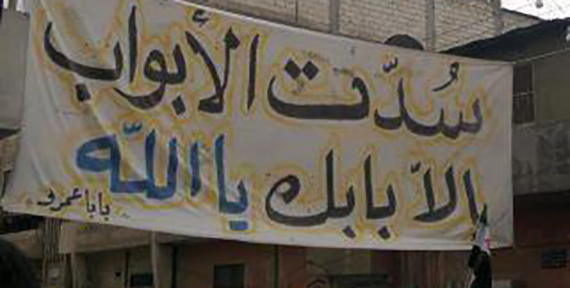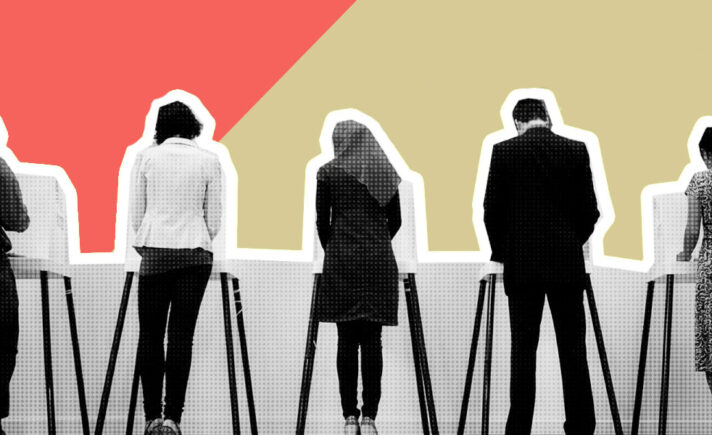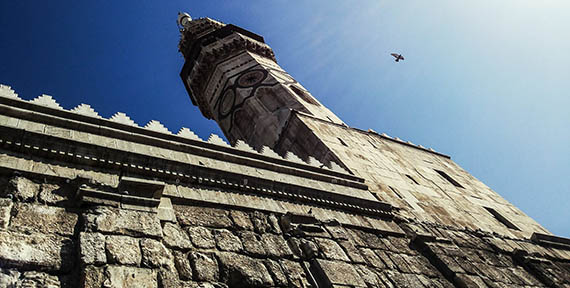The Syrian revolution was accompanied by a surge in religious fervor, and an inflamed popular sentiment, particularly manifested in slogans such as “It [the uprising] belongs solely to God,” and “Our leader shall only be our master Muhammad.” The passage of years wrought more havoc, violence and conflict, and religious extremism intensified. As Islamist currents continue to spearhead the struggle against the regime, many opposing currents have begun to emerge and proliferate, ranging from questioning certain rituals and sacred texts to outright atheism and renunciation of religion.
Thus, within a society often perceived to be moderately religious, puritans who strictly interpret and commit to religious doctrines are now face-to-face with those who are skeptical of them. Many refuse to recognize or even observe the growing numbers of young people abandoning traditional religion and losing faith in its ideals and claims. However, any sensible person could note that criticism of religion has become bolder, and that many young Syrians, especially in Europe, are abandoning the religious lifestyles they had previously upheld at home. This is gradually becoming a phenomenon which requires the intervention of the sheikhs, which denotes the gravity of a forthcoming clash about which we have no reliable studies or statistics.
While tackling a blasphemous article published in Rising For Freedom magazine, sheikh Osama al-Rifai spoke about atheism and atheists as coming out of the woodwork, and used unprecedented verbal violence and incitement against them. The sheikh referred to atheism as being a “crippled being” and called its followers “vermin,” stressing that they will not infiltrate Syrian society. This speech, however, may serve as proof that the discourse it confronts, which is critical of Islamic traditions and advocates freedom of thought, is in fact attracting more hearts and minds than the religious establishment rhetoric that had prevailed before 2011.
Among small circles of acquaintances, three previously religious girls have already taken off their hijabs in Germany, and five others living in Arab countries are awaiting the opportunity to do the same. Half of the young men I know have abandoned religious rites, such praying five times a day, observing Ramadan, or refraining from handshaking women… with at least 10% of them having “come out” as irreligious.
Beyond the individual scope, Arab social media is choke-full of anti-religious critics and their content, which fervently calls for the re-thinking of religious myths or ridicules them altogether. Perhaps Muslim women who no longer wear the hijab do not publicize their actions, as to avoid “social nuisance,” which may render the whole phenomenon indiscernible. However, gambits such as “the hijab challenge,” a social media initiative aimed at promoting hijab culture, point to the rise of its polar opposite, i.e. the widespread removal of the hijab.
Prior to the revolution, a considerable section of Syrian youths could not tell the difference between atheism and secularism, but can now distinguish between Muslims, Sunnis, deists, agnostics, unbelievers… and the list goes on. This can be explained by the long-lived Assad dictatorship, which consolidated a single-ideology, single-opinion and single-party state. As the the Syrian revolution erupted, people began to encounter new ideas, which begs the question: Did the revolution extrude the two extremes, Islamism and atheism, or has it rather allowed both to come into light? What is pushing young people today to stand against religious hegemony and dogmatism, and to question and scrutinize their faith as they never have before?
I will attempt to provide a sober analysis of the roots of this abandonment en masse of religious belief, away from the clichéd arguments of the West’s cultural invasion, or moral disintegration. I will instead focus on the youths who participated in the popular uprising, only to be dealt a bad hand and find themselves scattered in exile. This analysis may apply to other segments that were influenced by similar factors, but in the absence of studies and statistics, specification would be more accurate and objective.
Entanglement of Religion and Politics
Between the mid-1980s and 2011, several generations had been indoctrinated from a tender age to religious notions they received from mosques, schools and Quranic seminars conducted under the patronage of state authorities. The predominant Islam in Syria is the Islam that the regime, in collusion with its own cleric cohorts, allowed to exist.
Prevalent religious discourse emphasized warding off “Satan and politics,” with a few exceptions that remained invisible due to media blackout and repression. However, following the mass uprising in the streets, coinciding with the information revolution on social media, young people became more and more familiarized with other religious discourse on a broad scale.
In their struggle against injustice, many came to realize that religious and political authorities are “protective friends one of the other,” and that political despotism stems from religious absolutism As al-Kawakibi has said, “There has been no despot who has not claimed sacred status to be shared with God.” When the falsehoods in the regime’s version Islam became exposed, young people began unearthing the manifest elements of religion that are in cahoots with the regime, then rejecting more and more religious concepts and notions, with some going as far as losing their entire faith.
It is commonly known that religiosity in Syria flourished under the Baath party, which makes plausible the argument that the exposure of one of them will lead to the disintegration and decline of the other. In Syria, the prestige sheikhs had enjoyed was undermined alongside that of the regime. Post-revolutionary criticism and derision did not spare any religious figure as the revolution dissuaded people from idolization and broke the cult of personality that was common practice in Arab regimes, and especially in Syria. Revolutionary momentum overcame the traditional notion of one irreplaceable leader, endowing its legitimacy onto the streets. Even though the revolution has not achieved its political goals, and despite the calamitous Islamist “Syrian regimes,” the intellectual awakening is still ongoing. I would argue that “strangling the last king with the entrails of the last priest” is closer than it has ever been.
Free Access to Mass Communication
The internet and means of mass communication have evolved rapidly in Syria in recent years, somewhat in conjunction with the 2011 revolutions. This has done away with state monopoly over words, voices, thoughts and access to knowledge. Intellectual substance is now served to people on demand, without having to be stored in cellars or to meet provisioning requirements put forth by censors. Every person is now free to access information and present what they have. Having broken the wall of fear and repression, Syrian youths possess the courage, the freedom and the instruments of knowledge needed for their intellectual rebellion.
Sari, a 28-year-old Syrian who grew up in a conservative family, has always had questions about God and religion. The responses he often received were mostly silence, discouragement or more unsatisfying myths. He said that the books and videos he found online set him on a more rational path to answering his questions about the origin of creation and the fate of mankind. “It simply was an alternative unavailable in Assad’s Syria,” he commented, wondering how he used to believe whichever fact he would hear.
O’ God, We Have Tested You
As skulls were piling up and the bloodbath was flowing evermore profusely, the value of worn out words and temples of traditional clergy was being diminished. As the demons of the war were ruthlessly and indiscriminately turning everything into ash, gods stood aside and did not lift a finger. “O’ God, you’re all we have left,” throats screamed so loudly that they almost ruptured. But divine silence was painfully deafening.
“Something is wrong, then!” Attempts at intellectual reexamination have been present throughout the years of the revolution. Defeats often prompted the youths to inquire about the reasons, and to revisit some of the conceptions they had inherited: Is our understanding of the divine faulty? Does blame fall on the clergy? Have we been misled? Have we blown them out of proportion? Is the problem in history? In the hadith? In the Quran? Is it in God Himself?
In a few years, they theoretically and practically tested all the ideas and propositions they were offered. Looking for an answer to “What exactly went wrong?” many realized the dearth of religious philosophy, and the futility of chasing after the old, stifling sets of beliefs.
What these young people know at their core is that the revolution was not never a pursuit of religious gains, but an outrage at injustice and oppression. However, anyone who has participated or even observed the revolution could discern that religious zeal and revolutionary fervor are inseparable. The emotional heat that had erupted with the revolution later stirred deep-seated religious sentiments, which were an unparalleled fuel source in both stages: peaceful demonstrations and armed struggle. Hence, the initial ascension to heaven, which was soon followed by a tragic descent to hell, was in fact among the reasons why those who had placed their hopes on God felt utterly forsaken by Him.
A 20-year-old man who had fought with the Free Syrian Army, before seeking asylum in Germany, expressed his discontent with the religious discourse that has driven him to atheism. “We prayed in every way we could, and we wore ourselves out; we had sincere faith; we upheld the banner of Islam and committed ourselves to prayer,” he said, “but apparently the great divine victory we were promised was nothing but smoke and mirrors. It was the faithless tyrant who emerged victorious, drunken on the blood of our martyrs.”
Sudden Shift in Environment
It is fairly known among those who have lived in Syria that piety often takes the form of ritualistic constancy, in which social factors play a central role. It is also widely known that many women have been peer-pressured into wearing the hijab, and that religious belief did not occupy more than a couple of one-hour lessons per year. Piety was not taken entirely seriously, but it was its apparent manifestations which mattered the most.
It is understandable that there have hardly been any self-declared atheists in pre-revolutionary Syria. Religious communities generally prohibit their members from free thought. In order to maintain their strength and cohesion, they do not tolerate or condone any ideological deviation.
That said, as society plays a role in nourishing collective religiosity, societal shifts can easily result in religious transformations. Humans naturally have to adapt their disposition to the requirements of their time and place, as well as the community among whom they live. Accordingly, renunciation of religion can be explained by the mass exodus of forcibly displaced persons, their settlement in new communities, and the fragmentation of a society whose cohesion constituted a cruel and intolerant collective authority, as well as the rise of religious violence and Islamophobia. These factors have contributed to making “abandonment” and “declaration” of such abandonment both a pressing issue and a feasible feat. Additionally, many have had the opportunity to live within Western societies, which had long been demonized by our society and culture, and to witness with their own eyes that atheists are not idiots, and that they do not simplistically believe that humanity originated from apes, nor do they sleep with their mothers!
Although this change would primarily affect Syrians abroad, its impact will ultimately reach Syrians at home, since Syrian communities remain greatly interconnected.
Freedom of Expression
Syria has enjoyed relative tolerance concerning religiosity. Piety has not been as compulsory as its manifestations. At this point, we need to be perfectly clear: It is freedom of expression, not freedom of belief, that was lacking. As long as they are not publicized or promoted, irreligious beliefs and attitudes have long been tolerated in Syria. Social hypocrisy and religious façade were presented as satisfying and agreed upon modes of conducting oneself in the absence of religious commitment.The expression of rejection or criticism towards religion, however, had been unthinkable, and even punishable by social and religious pressure and ostracization. Only on a few instances have some managed to free themselves from the totalitarian social views and attitudes, whereby they attain minimum intellectual and spiritual autonomy.
A relative of mine, who lives in Turkey, exhibited acceptance when his daughter, who sought asylum in Germany, decided to remove her hijab; but he threatened to disown her if she were to post on Facebook pictures of herself without a hijab. His issue was not with his daughter’s abandonment of religious duty, but with her publicizing that before her family and society at large.
It seems that the conflict does not concern freedom of belief, but rather freedom of expression. This is why many Syrians only attend congregational Friday prayer, and drink alcohol only in secret or when abroad.
Abandonment of religion is thus not a direct result of the revolution or the diaspora, but of major social factors that have significantly brought it into the spotlight. Our history is rife with instances of people standing in defiance to religious doctrine, from ancient times until now, but they have been made an example of.
In Abdulrahman Badawi’s book From the History of Atheism in Islam, and in Brian Whitaker’s Arabs Without God, can be found many stories from the past and the present about the fates of atheists and publicly self-proclaimed apostates. While it is generally difficult to break away from the beliefs of society and maintain intellectual independence, let alone in a tradition with such prophetic Hadiths as “The blood of a Muslim man can only be righteously spilled in three [cases] … [one of which is] the one who forsakes his faith and separates from the community.”
One finds in Western societies, as well as on social media, relative freedom to express himself and his ideas without fearing for his life. It is hardly surprising that critics and rejecters of religion are in exponential increase.
Conclusion
Sheikh Mohammad Rateb Nabulsi is a renowned Syrian scholar. He has been a leading TV and radio personality for years, and is generously celebrated by Syrians and non-Syrians across the Arab world. In his rhetoric, Nabulsi relies heavily on “scientific miracles of the Quran,” narrating stories that contain “scientific facts” which support the Islamic faith and its holy texts. A few years ago, the sheikh enjoyed the unmitigated trust of his followers, back when people could not verify the information he propagated or the “facts” he often cited.
Recently, in his speech at the 16th American Islamic Congress, held in Chicago late last year, Nabulsi claimed that one of the Apollo 8 astronauts, when their vessel emerged from the Earth’s atmosphere, said “We have become blind and do not see anything.” He meant to demonstrate the “miracle” of the Quranic verse [15:14] “If We opened for the unbelievers a gate in heaven and they ascended through it higher and higher, still they would say: Our eyes were dazzled: truly, we must have been bewitched.” However, it seemed that many people promptly fact-checked that claim, only to find that the story mentioned by the sheikh is incorrect, and that what he attributed to the astronaut did not occur. This incident was a topic of discussion for several days on Facebook.
The revolution in information technology and means of communication has robbed the clerics of absolute validity, and made their statements liable to scrutiny. The effectiveness of religious indoctrination has changed dramatically. Old methods of preaching, antagonism and denial of the grave issues with religious discourse today, seem to be pushing more and more former Muslims away from unquestioning faith.







